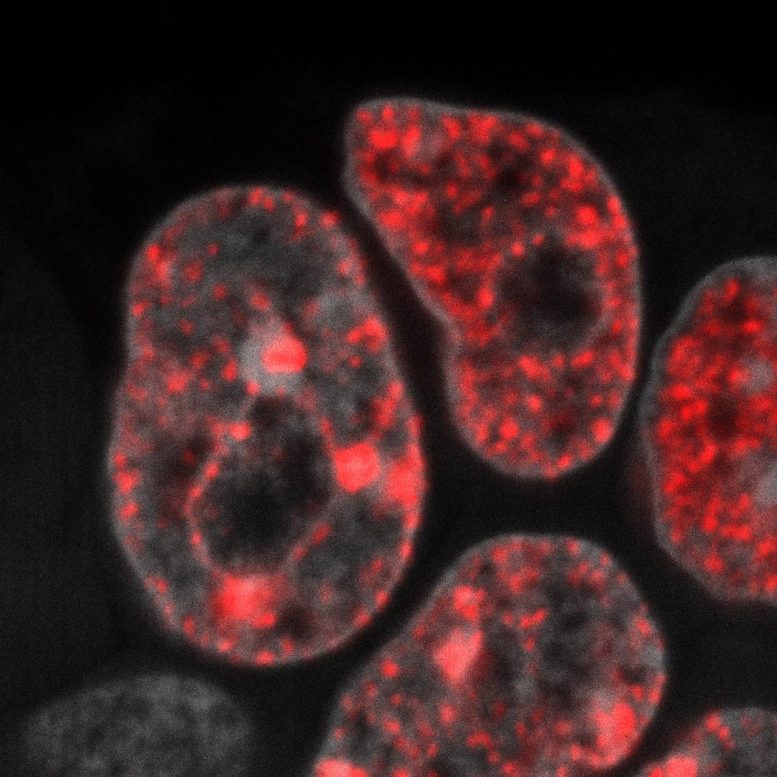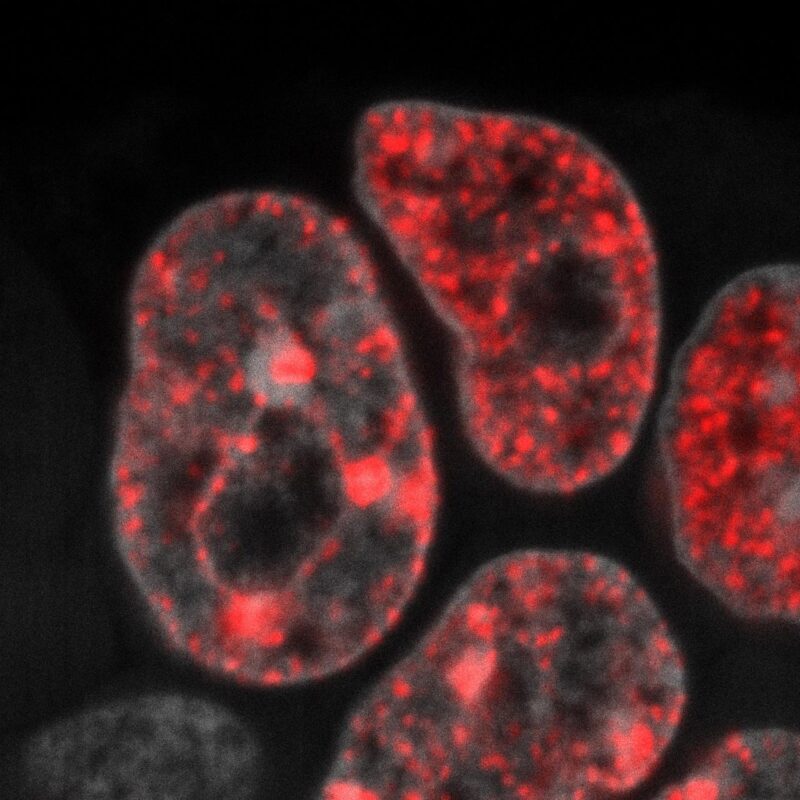
Réplication de l’ADN dans des cellules souches embryonnaires de souris. Rouge : ADN nouvellement synthétisé. Crédit : Helmholtz Zentrum München / Tsunetoshi Nakatani
Les cellules adultes de notre corps ne peuvent donner naissance qu’à un même type de cellule. Par exemple, une cellule de peau ne peut pas donner naissance à une cellule musculaire, mais uniquement à des cellules de peau. Cela limite l’utilisation potentielle des cellules adultes à des fins thérapeutiques. En revanche, au cours du développement précoce, les cellules de l’embryon ont la capacité de générer tous les types de cellules de notre corps, y compris les cellules souches. Cette capacité, appelée totipotence, a inspiré les chercheurs à trouver de nouveaux moyens de récapituler la totipotence par la reprogrammation cellulaire en laboratoire.
Les cellules totipotentes ont leur propre vitesse
Les cellules totipotentes ont de nombreuses propriétés, mais nous ne les connaissons pas encore toutes. Des chercheurs de l’institut Helmholtz de Munich viennent de faire une nouvelle découverte : “Nous avons découvert que dans les cellules totipotentes, les cellules mères des cellules souches, DNA replication occurs at a different pace compared to other more differentiated cells. It is much slower than in any other cell type we studied,” says Tsunetoshi Nakatani, first-author of the new study.
DNA replication, in fact, is one of the most important biological processes. Throughout the course of our lives, each time that a cell divides it generates an exact copy of its DNA so that the resulting daughter cells carry identical genetic material. This fundamental principle enables faithful inheritance of our genetic material.
The researchers discovered that the speed of DNA replication is also low in totipotent-like cells, which scientists can culture in a petri dish. Tsunetoshi Nakatani adds: “This led us to the question: If we manage to change the speed at which DNA replicates, can we improve the reprogramming of cells into totipotent cells?”
Less speed, improved cellular reprogramming
In an outstanding experimental effort, the researchers observed indeed that slowing down the DNA replication speed – for example by limiting the substrate that the cells use for DNA synthesis – increases reprogramming efficiency, that is, the rate at which cells can convert to another cell type.
“This is amazing,” says Maria-Elena Torres-Padilla, the leader of the study. “Over the years, we have been studying totipotent cells in order to learn how nature has made them so incredibly capable of generating all cell types of our bodies. This is a fundamental strategy of our research towards regenerative medicine approaches. This new concept is very simple, yet extremely important and we believe that it is a huge advance for stem cell therapy.”
Reference: “DNA replication fork speed underlies cell fate changes and promotes reprogramming” by Tsunetoshi Nakatani, Jiangwei Lin, Fei Ji, Andreas Ettinger, Julien Pontabry, Mikiko Tokoro, Luis Altamirano-Pacheco, Jonathan Fiorentino, Elmir Mahammadov, Yu Hatano, Capucine Van Rechem, Damayanti Chakraborty, Elias R. Ruiz-Morales, Paola Y. Arguello Pascualli, Antonio Scialdone, Kazuo Yamagata, Johnathan R. Whetstine, Ruslan I. Sadreyev and Maria-Elena Torres-Padilla, 7 March 2022, Nature Genetics.
DOI: 10.1038/s41588-022-01023-0
Prof. Maria-Elena Torres-Padilla is Head of the Stem Cell Center at Helmholtz Munich and leads the Institute for Epigenetics and Stem Cells. She is also Professor for Stem Cell Biology at Ludwig-Maximilans-Universität München (LMU). Tsunetoshi Nakatani is the first author of this study and is a postdoc in Torres-Padilla’s group at Helmholtz Munich.



